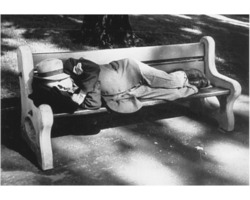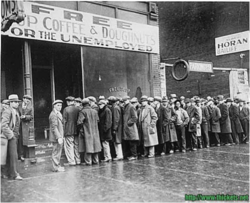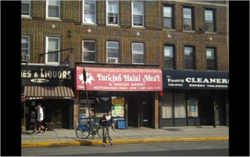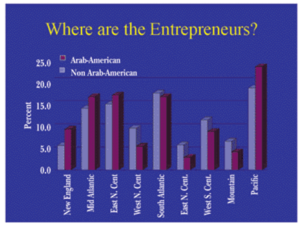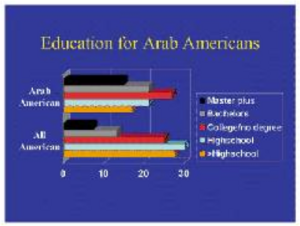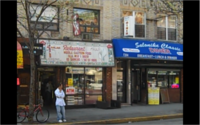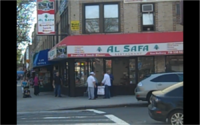From The Peopling of New York City
Contents |
Effects of the Great Depression on Immigration
The effects of the Great Depression on the United States were apparent, with the falling of the Stock Market and the loss of jobs everywhere. Amongst those affected by this catastrophic event, were the immigrants of the United States. Immigrants lost their jobs, homes, businesses, and savings, just about everything they had. Many of them became homeless, and began living on the streets doing whatever they can to get money for food to feed their children and themselves. Amongst these immigrants were the Arab American immigrants, who were a part of the minority immigrant populations in the United States. The struggles of the time, were seen throughout the nation and the world, and were not strangers to anyone living in those time periods.
The United States was at a point in which all it offered, economic stability, social class growth etc., were no longer offered due to the badly shaped economy. Immigrants who previously came to the United States for economic stability and opportunity no longer had these opportunities because of the depression, and many of their dreams were simply crushed amidst the rubble of the Stock Market Crash.
Effect of Economic Recession on Immigration
Trends of Arab American Immigration to the United States and the Economic Stability of the United States have an interestingly related relevance. Many immigrants from Arab countries come to the United States for the same reason that most other immigrants come to the United States for, which is economic freedom and stability. The economy of the United States is one of the biggest, if not the biggest, attraction for new immigrants from all over the world, due to the availability of jobs, the ability to rise in social class, and the laws of protection against discrimination, which includes economic discrimination.
During a recession, the economy is unstable and job losses are common; the United States was on track to lose more than 2 million jobs during the past recession. [2] Therefore, during the economic recession, it is not surprising to note that the amounts of immigrants to the United States decreases dramatically, which includes Arab American immigrants. The latest Census Bureau numbers cover the 12 months ending July 1, 2008, and the period includes the first seven months of the recession. [3] These numbers show how the economic downturn has affected the immigration numbers negatively.
The 1990 census data show 73,829 Arab-American and 13,408,206 non-Arab-American entrepreneurs. [4]
One cannot mention the economy of Arab American business without mentioning education. Education is a big part of Arab American success in the United States. Many immigrants come to the United States with nothing, but some of them come with degrees and diplomas. These allow them to settle down in an average paying job, making them a successful story of United States equal opportunity. Education is valued in Arab culture, and the United States is praised for its abundant availability of education for students, whether a part of the upper, middle, or lower class of the country. This is a big part of Arab American economic success in the United States.
Effects of 9/11 on Arab American Business
After 9/11, many Americans developed a stigma against Arab American immigrants, expecting them to have some sort of relation to the attackers on the United States. For this reason, Arab Americans were greatly affected by 9/11, in the years following it, and even until today. From their business production to simply the increased discrimination against them, Arab Americans were definitely negatively affected by the attacks on the World Trade Center.
Some of the specific ways in which Arab Americans were affected were business revenue. Businesses were simply boycotted by many Americans, and people developed a stigma against them, expecting them to be in relations with the United States’ attackers, Al Qaeda.
The Arab American immigrants, however, have not ceased to immigrate to the United States. Arab hopefuls, travel to the United States on a daily basis, to different parts of the nation, in busy cities in search for jobs and opportunities. Cities like Detroit, New York, Los Angeles, Philadelphia, Atlanta, Chicago, and many more are filled with Arab American immigrants, who all come for this same reason. No matter what the economic conditions of the United States is, or the stigmas and social stereotypes developed, these Arab American immigrants have continued and will continue to come to the United States. The United States is still the United States, and what it stands for is always the same, with the same goals and values of equal opportunity for all.
In addition, discrimination was prevalent in the United States, and especially in New York City, after 9/11. Continuous stories of Arab Americans being attacked after 9/11, as well as some innocent people who look like Arab Americans, began being heard of around New York.
References
1. ^ "Immigration to the United States." United States Immigration: Green Card, Visas and U.S. Citizenship. United States Immigration Support. Web. 01 May 2010. <http://www.usimmigrationsupport.org/immigration-us.html>.
2. ^ Dougherty, Conor. "Recession Slows Migration in U.S. - WSJ.com." Business News & Financial News - The Wall Street Journal - WSJ.com. The Wall Street Journal, 23 Dec. 2008. Web. 01 May 2010. <http://online.wsj.com/article/SB122998208060227699.html>.
3. ^ Dougherty, Conor. "Recession Slows Migration in U.S. - WSJ.com." Business News & Financial News - The Wall Street Journal - WSJ.com. The Wall Street Journal, 23 Dec. 2008. Web. 01 May 2010. <http://online.wsj.com/article/SB122998208060227699.html>.
4. ^ "Arab American Research." Home Page. Arab American Research. Web. 01 May 2010. <http://arabamericanresearch.com/pages/4/index.html>.
5. ^ "Arab American Research." Home Page. Arab American Research. Web. 01 May 2010. <http://arabamericanresearch.com/pages/4/index.html>.
6. Tung, Larry. "Immigrants Confront the Recession (Gotham Gazette, Nov 2008)." Gotham Gazette - the Place for New York City Policy and Politics. Gotham Gazette, Nov. 2008. Web. 01 May 2010. <http://www.gothamgazette.com/article/immigrants/20081103/11/2735>.
Related Wiki Pages
Home Page
Overview of Arab American Identity
Reasons for Arab Immigration
Effects of 9/11 on Arab American Assimilation
